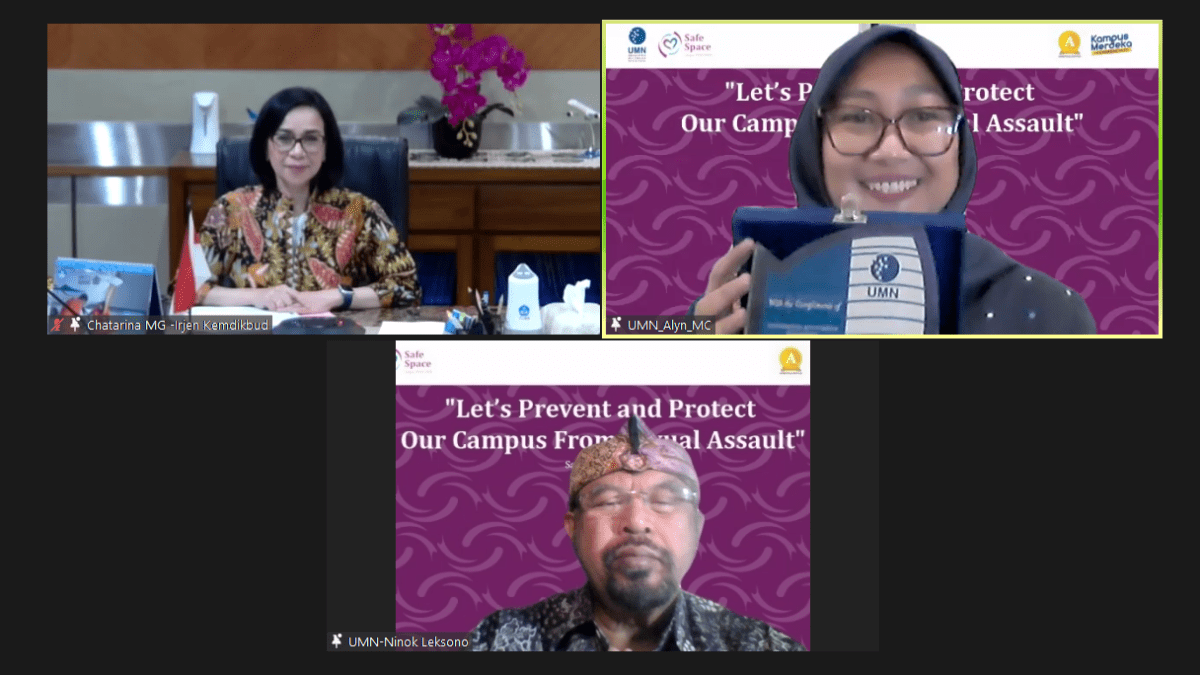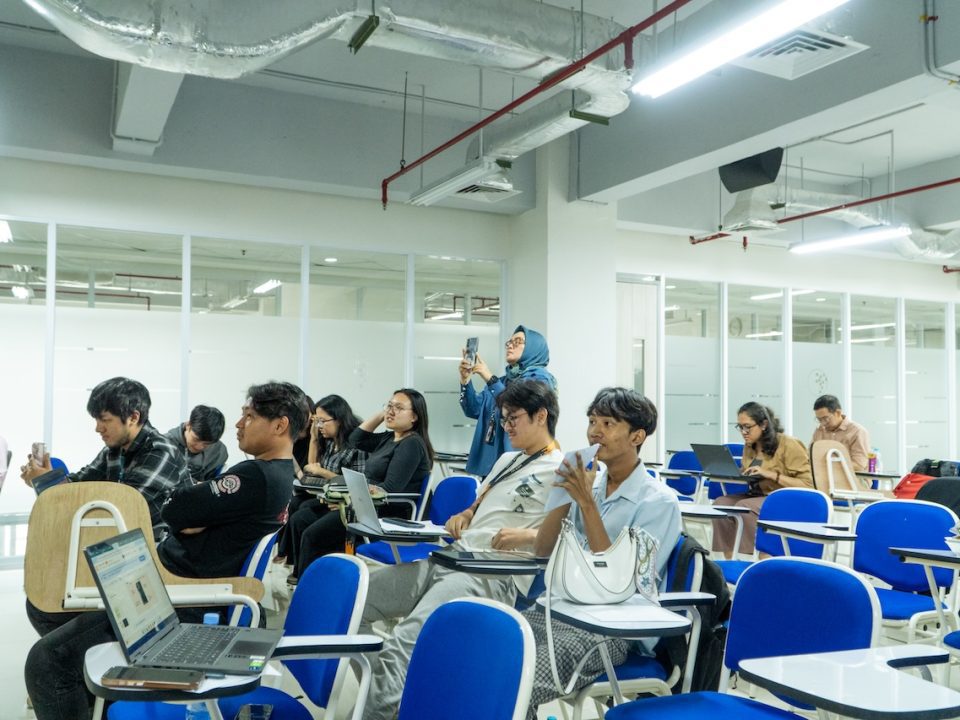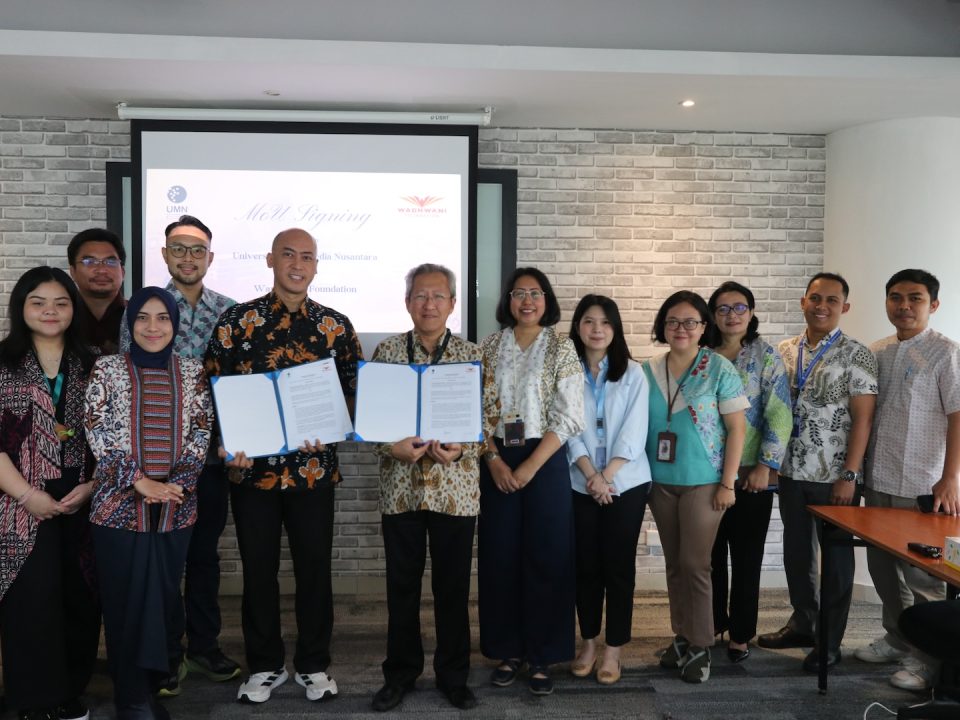
The Comparison of Private and State University Tuition Fees
June 17, 2022
UMN and MODENA Collaborate and Launches Kitchen Studio Lab
June 20, 2022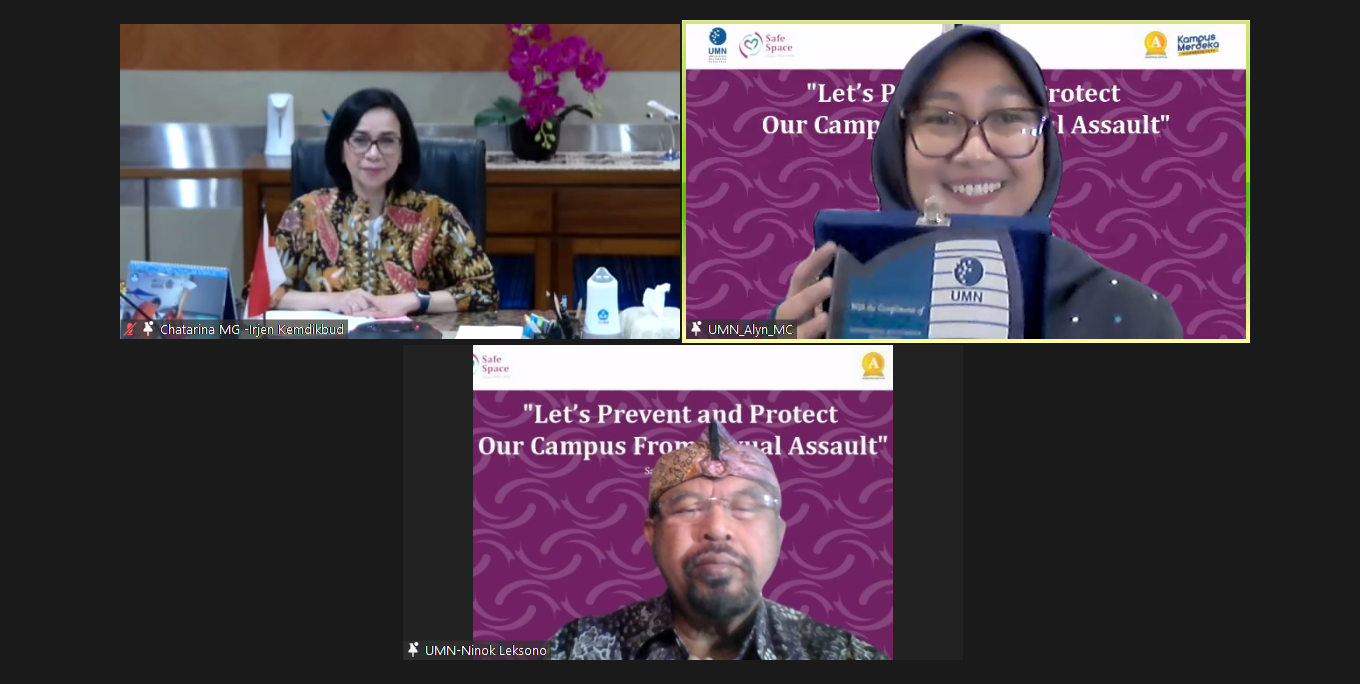
MoU signing with Dr. Chatarina Muliana. (Doc. UMN)
TANGERANG – Sexual assault cases have become a phenomenon on campuses in Indonesia. With that, Multimedia Nusantara University (UMN) conducted a workshop titled “Sexual Violence Prevention and Handling Training” from Wednesday (08/06/22) until Thursday (09/06/22). This workshop is conducted from UMN’s initiative to encourage other campuses, especially in the Higher Education Service Institute (Lembaga Layanan Pendidikan Tinggi/LLDIKTI) Region 3, to fight against sexual violence and support the survivors. This training received full support from UMN’s Higher Ups, the LLDIKTI 3, and the Director-General of the Ministry of Education, Culture, Research, and Technology (Kemendikbudristek).
“Regarding the topic we are discussing this morning, I would like to take the wisdom of an adage. ‘We’d better catch a mouse or tiger while it’s still small before it gets big and wild.’ The problem of sexual violence is better handled early on. Hopefully, we can free campuses from the practice and acts of sexual violence. Ohm Shanti Shanti Om,” Dr. Ninok Leksono, the Chancellor of UMN, said in his speech.
More than 200 participants from various universities attended this event. Camelia Catharina, head of the UMN Prevention and Handling of Sexual Violence (Pencegahan dan Penanganan Kekerasan Seksual/PPKS) Task Force, shows her appreciation, “Ladies and Gentlemen, this enthusiasm shows the high level of awareness from all of us from the higher-educational institutions on the problem of sexual violence that may happen on various campuses; and also the awareness to actively deal with these cases.”
UMN established the PPKS Task Force in early 2022, initiated by the Student Support Department of UMN, represented by Mrs. Ika Yanwarti, in response to the Regulation of the Minister of Education, Culture, Research, and Technology (Permendikbudristek) Number 30 of 2021. The PPKS Task Force team consists of 10 people, which includes lecturers, medics (UMN medical team), and students. The Task Force is divided into three divisions: Prevention, Reporting, and Support.
“Everything that will be discussed here is considered essential for every PPKS Task Force in UMN and other campuses to be able to provide maximum support for sexual violence survivors in campus,” Camelia said. This event is hoped to be able to open up a fruitful discussion between campuses, experts, and government officials here today regarding the implementation of the PPKS Task Force.
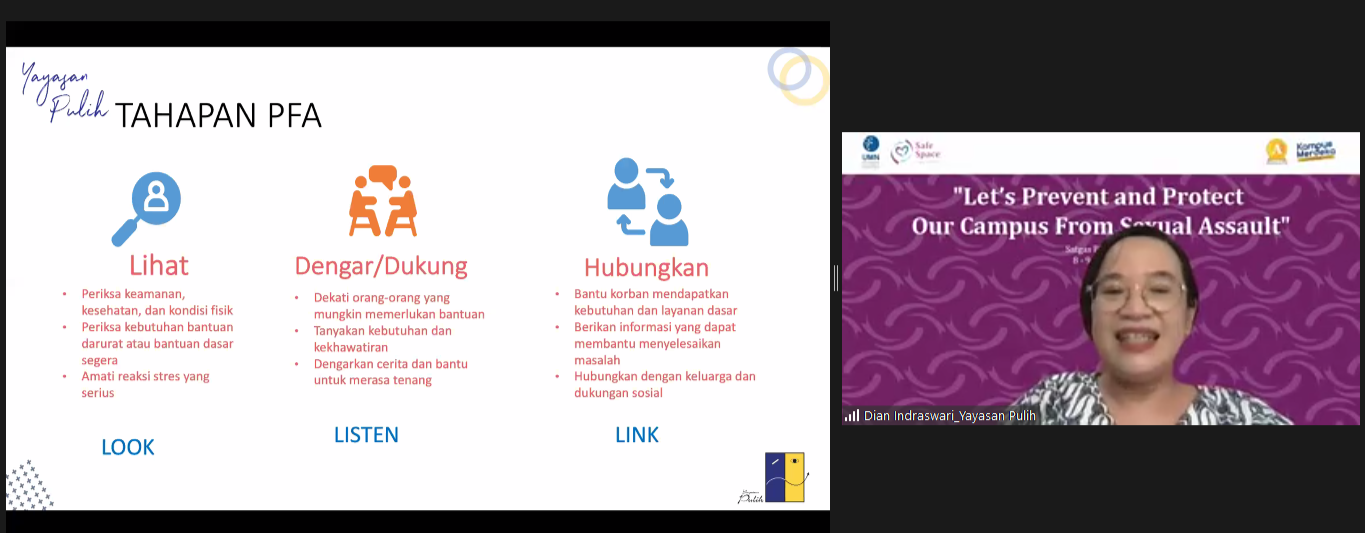
Yosephine Dian Indraswari, the Director Excecutive of Yayasan Pulih, explaining her materials. (Doc. UMN)
The workshop will discuss everything people need to know about sexual violence on campuses. The keynote speakers invited will talk about sexual violence on the psychological side and how sexual violence is dealt with through law. The keynote speakers invited are Yosephine Dian Indraswari, Executive Director of Yayasan Pulih; Siti Mazumah, Director of LBH Apik Jakarta; Dr. Ir. Paristiyani Nurwardani, Head of LLDikti Region III; and Dr. Chatarina Muliana, Inspector General of the Ministry of Education and Culture.
Psychological Handling of Sexual Violence Cases in Higher Education
The first part of the workshop discussed the psychological side of sexual violence cases in higher education. The discussion material was presented by Dian, the Executive Director of Yayasan Pulih. Yayasan Pulih is a community-based non-profit organization founded to address the need for affordable psychological services.
Before moving on to the materials, many people use the word “survivors” to label victims of sexual violence, especially for industries that provide psychological support services, such as Yayasan Pulih. Survivors are used because the word contains elements of strength to survive, the ability to bounce back and be able to deal with problems effectively, also known as resilience.
Victim Blaming
In sexual violence cases, whether it be in Indonesia or internationally, the problem that tends to arise is “Victim Blaming.” In most criminal or true crime cases, (obviously) the criminal is at fault. But in sexual assault cases, most of the time, the survivor tends to be shamed and blamed. “This happens because we live in a patriarchal society where women are seen as people who have domestic functions,” Dian explained.
Everyone can victim blame, even people who are supposed to protect and support the survivors like family members, close friends, professors, news media, officials, and even communities or organizations who are supposed to help sexual violence survivors (PPKS Task Force). The public must be educated and remove any negative stereotypes about sexual violence and stop victim-blaming.
Examples of victim-blaming are like, “why did you agree to meet up alone?” “Why didn’t you try to escape?” “Perhaps you were flirtatious and initiated it?” “What clothes did you wear?” What’s more obnoxious, some people would overlook survivors’ traumatic experiences and say that their trauma is nothing. “Well, you were only touched. You were only kissed.” Despite decades of sexual assault awareness globally, sexual violence is still overlooked, and people normalize non-consensual acts. Keep in mind that just because someone isn’t raped, it doesn’t mean that it’s less traumatic or less important. All non-consensual sexual acts are violent and a crime.
Dian emphasized that the effect sexual violence has on survivors vary. There isn’t a textbook generalized formula on how survivors would react when assaulted. Because of this, questions like “why didn’t you escape?” or “why didn’t you scream or cry?” should be irrelevant.
“Survivors tend to feel grossed out (about themselves) and even blame themselves. A ‘freezing’ or frozen reaction is common when survivors tend to freeze and stay still and silent due to shock and trauma when assaulted,” Dian explained.
Psychological First Aid
Dian advised campuses to implement a “Psychological First Aid” (PFA). PFA is the first response. This is a reactive measure done immediately after the occurrence or when the assault is disclosed to reduce the adverse effects of stress and prevent the emergence and worsening of mental health disorders. PFA is not something only professionals can do. Anyone with sufficient training can do PFA.
“It’s important to remember that not everyone wants the PFA. Don’t force aid, but be open and a safe place for those who want PFA,” Dian explained.
Here are some things to keep in mind before and when giving PFA:
- Before choosing to provide PFA, check the safety and physical condition. Some survivors may need medical attention or immediate mental assistance. Immediately provide emergency assistance if required.
- Conduct the PFA in a safe place for the providers and survivors. Ideally, conduct it where the companion (PFA provider(s)) and survivor can have privacy.
- Provide practical assistance such as water, tissues, and others.
- If the survivor requests, PFA can be done remotely. The provider should still empathize, show concern, and listen actively by focusing on intonation, tone of voice, and choice of words.
- Do not force survivors to directly tell the chronology of events. Be a listener. Let the survivor tell you what they want to tell, ask about their needs, and help the survivor feel calm. If the survivor wants to be accompanied by someone, don’t refuse.
- Don’t leave the survivor alone but don’t overwhelm the survivor. Give them time to master their emotions.
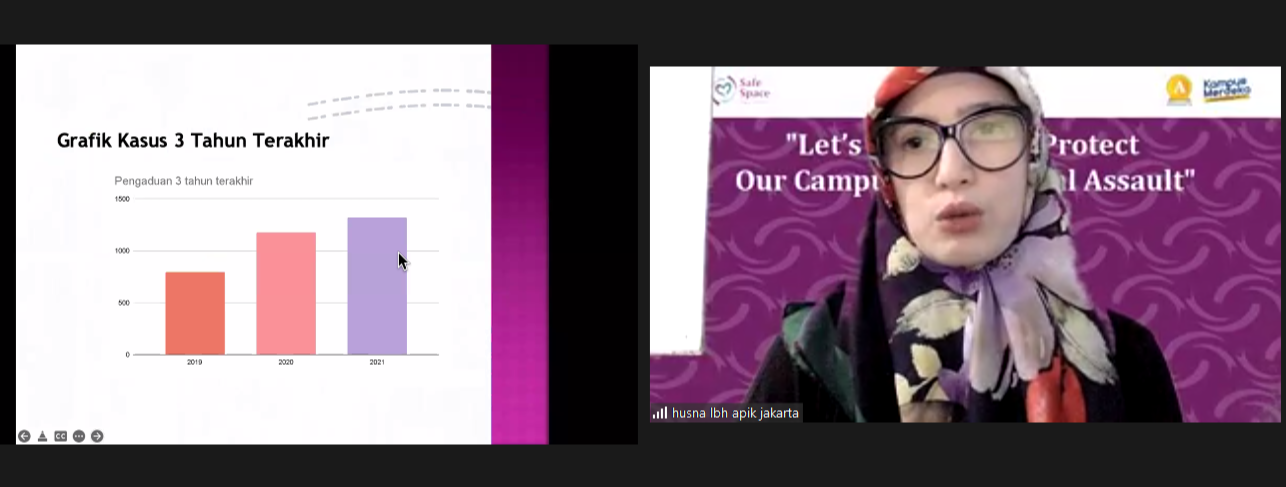
UMN Sexual Violence Prevention and Handling Training (Doc. UMN)
Legal Handling of Sexual Violence Cases in Higher Education
The workshop material on the legal handling of sexual violence cases in higher education was delivered by Siti, the Director of Legal Aid for the Indonesian Women’s Association for Justice (Lembaga Bantuan Hukum Asosiasi Perempuan Indonesia untuk Keadilan/LBH Apik) Apik Jakarta. Siti said that LBH has been working with students for a long time to discuss the laws and regulations for dealing with sexual violence on campus.
Siti explained that there was a significant increase in cases during the pandemic. In 2020, the highest reported cases of violence were domestic violence (418 reports), while in 2021, the highest reported case was online gender-based violence (489 reports). Violence-related cases continue to increase in various places, including campuses, making it essential for universities to implement proper Standard Operating Procedures (SOPs). Here’s Siti’s advice:
- Prevention: state and announce that sexual violence is one of the offenses that will receive strict and severe punishment. This rule must be issued in the Rector’s Decree. Ideally, when students register or when lecturers or staff apply for jobs, they are notified through the Rector’s Decree that if they are found to have committed sexual violence, there will be sanctions. Doing this also helps prevent a weak legal footing. There must be punishments on and off-campus. The perpetrator shouldn’t only receive punishment off-campus.
- Complaints/Reporting Mechanisms: ensure that the campus has facilities, and hotlines for sexual assault reports, either online or offline. Ensure that the complaint post is safe for the survivors or potential witnesses.
- Handling (Survivor’s Rights Defender): provide support for survivors such as counseling, leave (temporary leave for students or professors who are survivors), and immediately take action on the problem and provide sanctions for perpetrators.
Siti also explained that LBH functions as a backup, a means of legal consultation for students on campus. LBH notes that they never make decisions for the survivors. LBH will explain all the options and legal implications, allowing survivors to choose the path best for them.
Universities must know the legal umbrella for sexual violence cases:
- KUHP (Book of Criminal Law)
- KUHAP (Book of Criminal Procedure Law)
- Law on the Protection of Witnesses and Victims
- Regulations of the Ministry of Education, Culture, Research, and Technology
- SOP of Sexual Violence handling
“The perpetrators must be punished. Such as light administrative sanctions in the form of a written warning, or a written apology statement published on campus internally or in the mass media. Medium-level sanctions are like temporary dismissal for professors or staffs from their position without obtaining any rights and banning students (temporarily) from attending classes or receiving scholarships. Finally, the heaviest administrative sanction is dismissal. Dismissal as a student or dismissal as a lecturer,” Siti explained.
Implementing the Permendikbudristek Law to Create Safe Spaces on Campus
Chatarina, the Inspector General of the Ministry of Education and Culture, continued the discussion by discussing the implementation of Permendikbudristek Number 30 of 2021.
“The Ministry of Education and Culture was born to encourage campuses to care about sexual violence. Cases of sexual violence show an iceberg phenomenon; almost all campuses have cases of sexual violence,” explained Chatarina. Now, sexual violence is becoming more difficult because the percentage of sexual violence that leads to penetration or rape is less than other sexual acts of violence, and there are no witnesses. This makes it difficult to prove.
Chatarina explained that the policy to prevent sexual violence was included in episode 14 of the Education Transformation Program – Merdeka Learning Campus. The government wants to fulfill the right of every citizen to have a safe and enjoyable learning process for them to achieve optimal learning.
Here is the definition of sexual violence in Permendikbud 30/2021 (Ps 1), “Sexual violence is any act of humiliating, insulting, harassing, and/or attacking a person’s body, and/or reproductive function, due to inequality in power relations and/or gender, which results in or it can result in psychological and/or physical suffering, including those that interfere with a person’s reproductive health and the opportunity to carry out higher education safely and optimally is lost.”
Chatarina added that the Permendikbud law would also ensure that campuses implement an adequate system to prevent and handle sexual violence on campus. As in articles 10 to 19, universities must provide assistance, protection, recovery of survivors, and the imposition of administrative sanctions. Universities that do not carry out the four measures will be subjected to sanctions such as cessation of financial assistance or assistance with facilities and infrastructure or a decrease in the level of campus accreditation.
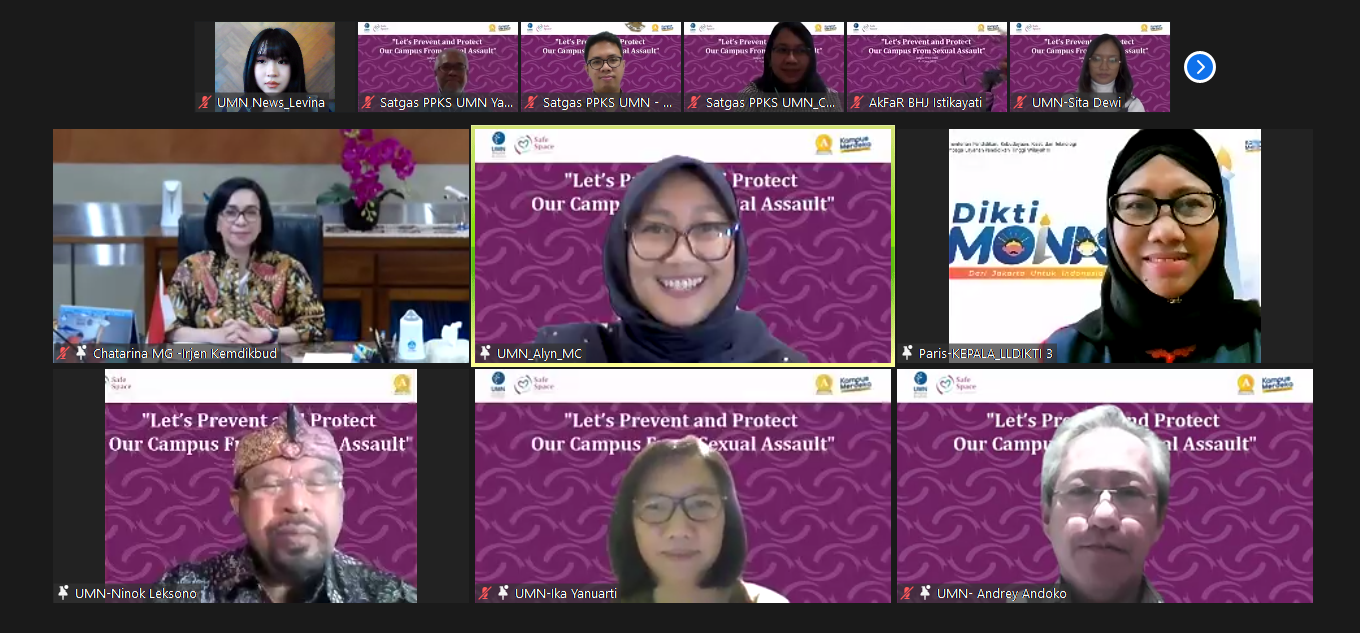
UMN conducted a workshop on preventing and the handling of sexual violence cases in campus. (Doc. UMN)
Campuses must report on the performance of their PPKS Task Force and maintain transparency. Chatarina reminded that the number of cases does not always indicate that the campus is terrible. There will be no sanctions for the number of cases. The Ministry of Education and Culture appreciates an open campus and tries its best to solve problems. Reports are not just case reports. If there are no cases, universities can report their performance, such as how they have formed the PPKS Task Force? What has been done? And others.
The following is the definition of sexual violence in Permendikbud 30/2021 (Ps 1), “Sexual violence is any act of humiliating, insulting, harassing, and/or attacking a person’s body, and/or reproductive function, due to inequality in power relations and/or gender, which results in or it can result in psychological and/or physical suffering, including those that interfere with a person’s reproductive health and the opportunity to carry out higher education safely and optimally is lost.”
Chatarina added that the Permendikbud would also ensure that the head office implements an excellent system to prevent and handle sexual violence on campus. As in articles 10 to 19, universities must provide assistance, protection, recovery of victims, and the imposition of administrative sanctions. Universities that do not carry out the four measures will be subject to sanctions such as cessation of financial assistance or assistance with facilities and infrastructure or a decrease in the level of campus accreditation.
Campuses must report on the performance of their PPKS Task Force and maintain transparency. Chatarina reminded that the number of cases does not always indicate that the campus is terrible. There will be no sanctions for the number of cases. The Minister of Education and Culture appreciates an open campus and tries its best to solve problems. Reports are not just case reports. If there are no cases, universities can report their performance, such as how they have formed the PPKS Task Force? What has been done? And others.
Paristiyani, the Head of LLDikti Region III, emphasized the importance of having a solid system to develop and implement PPKS according to the regulation of Permendikbudristek Number 30.
“We also hope that UMN and other campus friends who are present today will actually carry out training for the prevention of sexual violence; be it for the task force or organizations under the task force and universities with the implementation of Permendikbudristek Number 30. And that is continuous and integrated with the Tridarma of Higher Education process,” Paristiyani said.
“We really appreciate UMN’s action to be alert and form a PPKS task force immediately and also the initiative to invite other fellow campuses. This shows that there is a concern for UMN not only for its own campus but for other campuses as well,” Dian said in the closing ceremony.
This workshop is the first step for UMN to eradicate sexual violence at UMN and other campuses. UMN’s efforts also do not stop here; there will be various more training in the future. It is hoped that this workshop is valuable and can help every university be ready and alert in handling cases of sexual violence on their respective campuses.
Sexual violence is not trivial and we are here for you. If you experience sexual violence or have seen an act of sexual violence in campus, please report it to:
UMN’s Hotline for Sexual Violence reportings : https://bit.ly/LaporKSUMN
The Ministry of Education and Culture’s Hotline for Sexual Violence reportings: https://bit.ly/MerdekaDariKekerasan
*by Levina Chrestella Theodora | UMN News Service
Kuliah di Jakarta untuk jurusan program studi Informatika | Sistem Informasi | Teknik Komputer | Teknik Elektro | Teknik Fisika | Akuntansi | Manajemen| Komunikasi Strategis | Jurnalistik | Desain Komunikasi Visual | Film dan Animasi | Arsitektur | D3 Perhotelan | International Program, di Universitas Multimedia Nusantara. www.umn.ac.id

